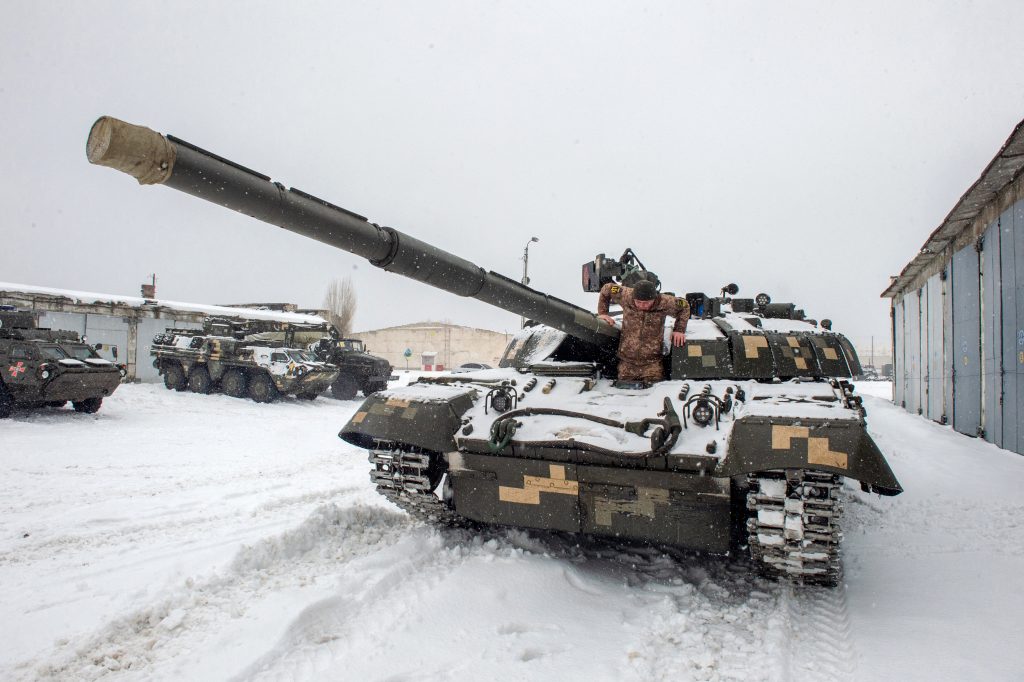The EU and its member states decided on Tuesday evening to impose a first package of targeted sanctions against Russia after its recognition of the two breakaway regions in eastern Ukraine and its sending of troops into the areas held by pro-Russian separatists.
The political decision to impose sanctions was taken at a special informal foreign affairs council meeting of EU foreign ministers in Paris organised by the French EU Presidency. High Representative Josep Borrel outlined the sanctions at press conference in the evening.
His spokesperson told The Brussels Times that the legal procedure is expected to be completed later today by the Council when the decision will be published in the Official Journal of the EU.
As previously reported, Borrell warned Russia last week at a hearing in the European Parliament that the sanctions would “prohibitively expensive for Russia and for its oligarchs” but the first package of sanctions fall short of that although he expects them to hurt Russia economically.
“This package of sanctions that has been approved by unanimity with the member states will hurt Russia, and it will hurt a lot,” he asserted.
As previously stated on Tuesday by the European Commission President von der Leyen and Council President Michel, the measures target those who were involved in the illegal decision, banks that are financing Russian military and other operations in the breakaway regions, trade from the regions to and from the EU and, last but not the least, Russia’s access to EU’s financial markets.
Altogether the 351 members of the Russian parliament (Duma) who voted for the recognition of the separatist so-called people’s republics and 27 other Russian officials and entities from the defence and banking world will be listed by the EU and subject to sanctions. Their names have not yet been published.
In addition, German Chancellor Olaf Scholtz announced on Tuesday that German will suspend the administrative process of certification of the North Stream 2 natural gas pipeline in the Baltic Sea which bypasses Ukraine and connects Russia and Germany. This will potentially hit Russia’s export but also disrupt the supply of Russian gas to Europe which amounts to about 40 % of the total gas import to the EU.
But this is not the end of the story, according to Borrell. The EU will raise the level of sanctions depending on the development on the ground and Russia’s behaviour, e.g., if it will extend its invasion of the Donetsk and Luhansk regions and move its troops into the areas held by Ukraine that control about two thirds of the regions.
The Russian troops around Ukraine remain in position for a massive invasion of Ukraine with little notice, warned the NATO general-secretary, Jens Stoltenberg, on Tuesday. “Every indication is that Russia is continuing to plan for a full-scale attack of Ukraine,” he said, adding: “It’s never too late not to attack.’’
Borrell defended the relatively moderate package of sanctions against Russia as striking a balance between strong measures now and keeping measures “in reserve” for further deterrence. He admitted that sanctions alone cannot stop further Russian military moves. “Sanctions come with a cost and don’t have a miraculous effect,” he said.
He still hopes that it will be possible to bring Russia back to the negotiating table and find a diplomatic solution to the conflict and avert full-scale war which would cause immense suffering for the Ukrainian civilian population and military losses on both sides.
Can Kremlin be trusted at all after having violated the agreements it have signed? In a statement on Tuesday, Borrell condemned the Russian aggression as an “illegal act which further undermines Ukraine’s sovereignty and independence and a severe breach of international law and international agreements, including the UN Charter, Helsinki Final Act, Paris Charter and Budapest Memorandum.”
As a signatory of the Minsk agreements, Russia has a clear and direct responsibility to work to find a peaceful settlement of the conflict in line with these principles, Borrell underlined.
“With the decision to recognise the non-government-controlled region of eastern Ukraine as ‘independent states’, Russia is clearly violating the Minsk agreements, which stipulate the full return of these areas to the control of the Ukrainian government.”
Any diplomatic solution would have to guarantee Ukraine’s independence and territorial integrity while addressing Russia’s security concerns about NATO’s expansion to countries in its immediate neighbourhood that belonged to the sphere of influence of former Soviet Union. A total new security order for Europe would have to be negotiated.
M. Apelblat
The Brussels Times

